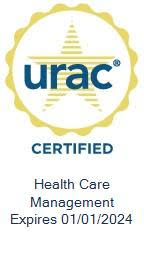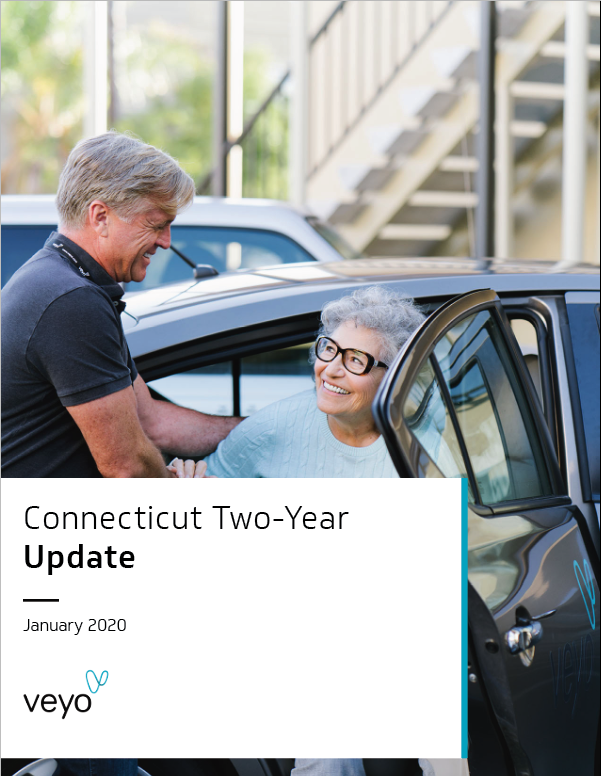Response to the 2020 Connecticut Audit
February 19, 2020
Since launching in Connecticut in January of 2018, Veyo has worked with DSS to continuously improve NEMT services to HUSKY Health members. Last year, we had the opportunity to work very closely with state auditors to critique every aspect of our service and provide a fresh lens on our operations in Connecticut. We welcomed the audit and were optimistic that it would assist in separating fact from fiction, clearly separate legitimate opportunities for improvement from unfounded fears, and focus all attention on strategies and tactics that will continue to improve the program.
In addition to offering recommendations for operational improvements for our service in Connecticut, the audit also highlighted the improvements made since launch, such as first call resolution and the performance of Veyo’s IDP fleet. We concur with over 60% of the review findings and have already implemented 14 of the recommendations that we agree will improve the quality of service for the HUSKY Health members. In addition to existing efforts, we also will be implementing at least 12 additional changes in the next two months thanks to the audit recommendations. These efforts meet or in many cases exceed the audit requirements and include:
- Ensuring that the definition of call center abandonment rate is clearly defined and set at 60 seconds in operational policies and procedures. (Finding 5)
- The exclusion of abandoned calls from the calculation of average time to answer calls to the Non-Emergency Medical Transportation call center. (Finding 7)
- The reporting of Money Follows the Person trips separately from NEMT trips. (Finding 10)
- The consistent definition and reporting of timely pick-ups, based on whether the member arrived to his or her appointment on time. Stakeholders will be informed of the definition. (Finding 12)
- Reporting the requests and fulfillment of no-multi load trips. (Finding 14)
- Updating the definition of “wait time” from 5 minutes to 10 minutes. (Finding 22)
- Launching a workgroup to investigate the effect of Veyo’s trip closure process on trip data. (Finding 24)
- Reinforcing with our contracted transportation providers that they should confirm the identity of members prior to transport. (Finding 27)
- The implementation of an instant ticketing system that will generate automatic reference numbers for all complaints entered via email, phone, or the web form. (Finding 40)
- The addition of an additional prompt to our phone lines that will direct callers to a specific line for capturing complaints. (Finding 44)
- Translating Notice of Action (NOA) forms into Spanish. (Finding 46)
While we wholeheartedly support and endorse the majority of the recommendations, we also feel that it is imperative for us to raise concerns with certain portions of the audit report. In particular, we disagree with some of the findings, and find that certain findings were based on incorrect assumptions or misunderstanding of the facts. Specifically:
- Utilization, Trip Counts, and Trip Modes:
- The audit report suggests that Veyo may be delivering fewer vehicle trips to members. In fact, the opposite is true. Utilization of Connecticut’s NEMT program has grown substantially since the previous vendor. The number of completed trips has increased 38% since launch in January of 2018, in large part due to a substantial increase in behavioral health and substance abuse treatment trips. Veyo’s program completed over 4,800,000 trips in 2019 and is now delivering more ambulatory trips per member, more public transit trips per member, and more mileage reimbursement trips per member than the previous vendor.
- The Collection and Tabulation of Data:
- The report calls into question Veyo’s on-time percentage reporting and calculations, and suggests that Veyo has opaquely changed its calculation methodology without reason or explanation. This is untrue. Veyo is the only broker in the industry which reports on GPS/time-stamped data points, rather than simply self-reported statistics by transportation providers. Veyo collects millions of data points related to its operations – far more real-time GPS data than any other NEMT broker – and more than ever before in NEMT program history. In addition to collecting data, Veyo is constantly integrating with new third-party systems to help improve services. As the NEMT program has evolved, Veyo has worked closely and transparently with DSS on ensuring that Veyo’s reporting accurately represents Veyo’s performance. This has included making adjustments and corrections to the existing reporting where warranted. Any changes to the data tabulations or reporting were agreed upon and communicated to DSS and stakeholders before the changes were implemented. Veyo rejects any notion that it changed the data in its reports to make itself look better, or that changes were made without explanation and transparency.
- Local Hiring:
- The report suggests that Veyo is not meeting its contract requirements with respect to usage of in-state employees, or is substantially supporting the Connecticut program with out-of-state employees. This is untrue. While at times in the contract’s history there have been a substantial number of phone calls routed to agents out of state (something that is explicitly permitted by the contract and clearly outlined in Veyo’s RFP response), Veyo notes that the overwhelming majority of employees who work on the Connecticut contract are in fact based in the state. There is no express requirement for the percentage of calls managed in the state, but in any case, that proportion has been over 50% in recent months. The report highlights one single point in time and does not take into account data from recent months.
- Complaints and Safety:
- The report lists a few examples of potential safety issues as the basis for a number of findings, without putting into context the enormity of the program. Veyo always puts member safety and concerns as its first priority and takes any concern around safety and/or complaints seriously. Veyo is always working in partnership with DSS to amend and improve safety policies and standard operating procedures to continue to exceed industry standards in every respect. HUSKY Health members travel over 40 million miles on Connecticut roadways each year under the Veyo NEMT program with thousands of different drivers and an incident rate of just 0.005%. While any safety incident is highly regrettable, Veyo acknowledges that with such a large volume of trips (nearly 2 million ambulatory and wheelchair trips per year), it’s very difficult to avoid a small number of incidents. We can only continue to refine policies wherever an opportunity comes to light. That said, Veyo carefully studies each incident to determine if employee or provider errors were made and/or if further refinements to policy and procedure can be made to prevent future incidents. While Veyo wholeheartedly agrees to any sensible safety recommendations from the audit report, it regrets that the small number of examples provided were not put into context as isolated incidents representing a tiny fraction of a percent of trips. It also wants to point out that its existing safety practices and policies already exceeded industry standards. HUSKY Health members can rest assured that there is an extremely comprehensive and industry-leading safety program operating behind the scenes at Veyo.
- Veyo has always been transparent about how it defines and records complaints. Veyo has made a consistent effort to indicate to the community the numerous avenues by which complaints can be submitted, either through DSS or directly through Veyo’s numerous channels. Some issues can easily be solved on the spot, and Veyo is very proud of its ability to uniquely solve or clear up any potential issues in a first-call resolution manner, unlike other brokers which do not operate real time tracking systems. We understand that there could be different perspectives on what constitutes a complaint when an issue is easily solved in real time, but we reject the notion that we have at any point in time not been adhering to our own public definitions and interpretations as a matter of policy and operating procedure. Nevertheless, we are very open to aligning with further DSS expectations around these definitions.
Veyo understands that the complexity of the NEMT program can cause misunderstandings about its data, its processes, and perceptions about the relative success of the program. In every respect, we firmly stand behind our industry leading technology, operational model, employees, and all the remarkable improvements we’ve made to Connecticut’s NEMT system. NEMT is incredibly challenging, and no other broker is driving improvement as aggressively and rapidly as Veyo. We are committed to making improvements based on the recommendations in the audit report, as evidenced by the number of initiatives already completed or in the process of being implemented. While we don’t agree with all of the analysis in the report, we remain committed to finding solutions to any and all issues and committed to working with all stakeholders in Connecticut to drive progress forward. We are very optimistic that we can reach full alignment and shared understanding on Veyo’s processes, data, and all aspects of the program.


